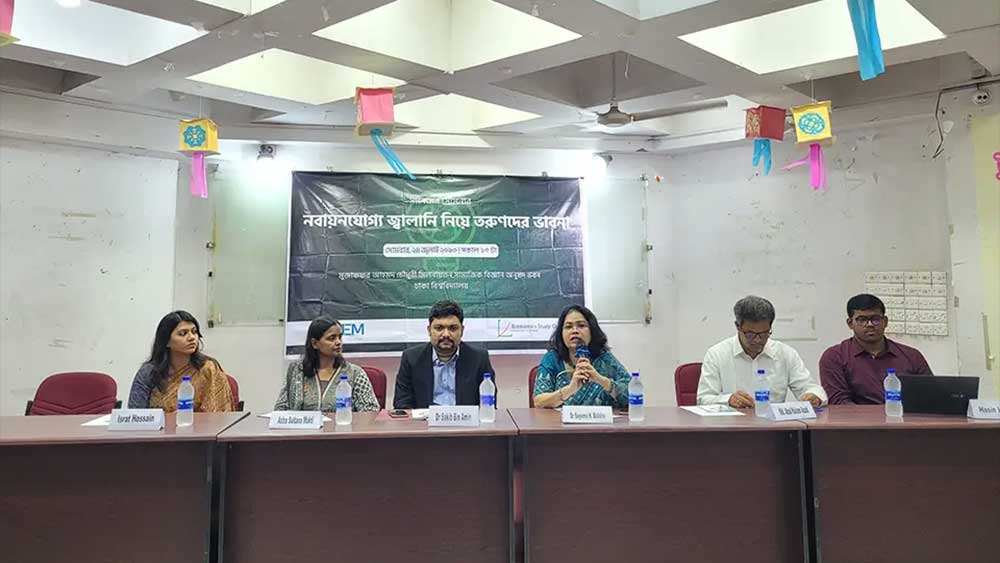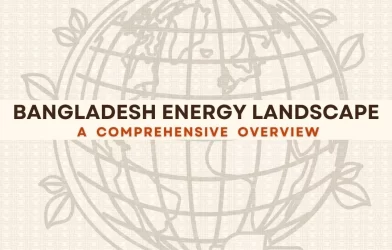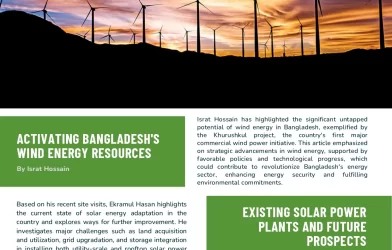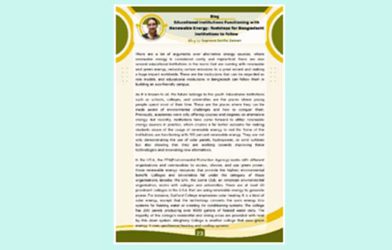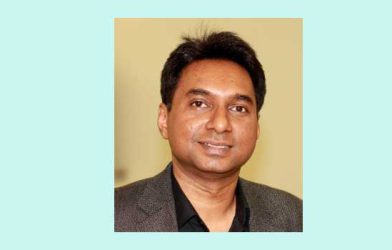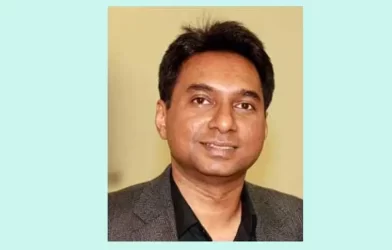Event Summary:
South Asian Network on Economic Modeling (SANEM) and Economics Study Center (ESC) collaborated to arrange a seminar titled “Youth’s Perception on Renewable Energy” on 24 July 2023 at Professor Muzaffar Ahmed Chowdhury Auditorium, University of Dhaka. The event aimed to address the growing energy crisis in the country, find the reasons and explore sustainable solutions offered by renewable energy sources.
The seminar opened with welcome remarks from Dr Selim Raihan, Professor at the Department of Economics, University of Dhaka, and Executive Director of SANEM, and Ms Farha Tasneem, President of the Economics Study Center. In his welcome remarks, Dr Selim Raihan introduced the panellists, welcomed the guests, and introduced the inspiration behind organising the seminar. He attracted everyone’s attention to the economic effect of fossil and renewable fuels and their environmental impact. Ms Farha Tasneem, ESC President, outlined the circumstances responsible for the recent increase in fuel prices in her welcome remarks, emphasising the importance of turning toward renewable energy.
Chaired by Dr Sayema Haque Bidisha, Professor at the Department of Economics, University of Dhaka, and Research Director of SANEM, the event also featured Ms Israt Hossain, Senior Research Associate at SANEM, who delivered a keynote presentation on the importance of renewable energy in Bangladesh’s future. Ms Israt presented an overview of Bangladesh’s current energy situation. Overreliance on a fuel that has a very volatile price record like LNG, overcapacity of the country’s power generation capacity due to mainly shortage of fuel and inefficiency of powerplants, increased cost of buying electricity from Independent and rental Power Producer (IPP), increasing transmission loss, BPDB’s continuous loss, etc. were mentioned as main reasons behind the crisis. The presentation emphasised the budget allocation for the energy sector, pointing out that most of the budget was allocated to the power division, and the amount assigned to the Energy and Mineral Resources division was insufficient to explore the development of the renewable energy sector. Despite having the potential to produce 40,000 MW of energy from the solar energy sector, the country produces only 924.5 MW- the presentation noted while mentioning other potential renewable energy sectors as well.
The panel discussion included esteemed experts in the field, including:
- Dr Sakib Bin Amin, Associate Professor at the Department of Economics, North South University;
- Mr Md. Abul Kalam Azad, Manager-FGGIII, ActionAid, Bangladesh;
- Ms Aziza Sultana Mukti, Head of Operations, SOLshare;
- Mr Md. Hasin Israq, Student, Department of Economics, University of Dhaka.
The panellists demonstrated excellent insights and comprehensive coverage of various aspects related to renewable energy. They offered valuable perspectives on the challenges and opportunities for harnessing renewable resources in Bangladesh and addressed questions from the attending youth.
Dr Sakib started the discussion by stressing the importance of energy in every aspect of economic and industrial activity over the course of time. He acknowledged the development of the energy sector in the previous decade through government policies and the private sector’s contribution. Dr Sakib provided a ‘4-A’ framework to evaluate various energy sources, which includes availability, affordability, applicability, and acceptability. His discussion shed light on the development and structure of the energy sector over the years after independence. Bangladesh has witnessed three Power Supply Master Plans in this century. The first proposed a natural gas-powered energy system, while the third shifted to more affordable gases. The country has been seeing declining natural gas stock, forcing it to invest in cost-ineffective LNG. In addition, the country lacks skilled labour in the energy industry, resulting in inefficiencies. In the end, the speaker suggested promoting rooftop solar systems to increase the contribution of renewable energy in the long run while urging policymakers to allocate more resources to renewable energy.
Ms Sultana spoke on the problems and prospects of renewable energy in Bangladesh. Climate change has long been an important issue, particularly for the inhabitants of this region. However, the rural people have been facing severe electricity shortages compared to the country’s urban people, and solving it has become one of the most critical issues. Ms Sultana raised the issue of auto-rickshaw batteries, which threaten the environment for various reasons, and suggested switching to a virtual power plants (VPPs) system. She also advised transferring the charging burden of these batteries to off-peak hours to achieve low system costs, a stable grid, high quality of power, and a high share of renewable energies.
MrIsraq began by explaining the present state of the government’s numerous initiatives and emphasising the need for policy consistency and implementation. According to Vision 2041, the government intends to grow its power production capacity to 40,000 MW by 2030 and 60,000 MW by 2041, with renewable energy accounting for 30% in 2030 and 40% in 2041, as stated in the Mujib Climate Prosperity Plan 2016. To meet the target, the country needs nearly tenfold its present renewable energy production capacity by 2030 and 20fold by 2041. However, the prior track record is not encouraging, as the government aimed to boost RE’s contribution to 5% by 2015 in the REP 2008, which has yet to be reached even after eight years. The seminar’s youngest panellist also pointed out how the government could have invested in RE projects like its neighbour India instead of extensively investing in LNG infrastructure, meeting the 30% RE contribution objective by 2030. The panellist proposed an energy demand and supply system to meet the government’s goal of zero carbon emissions by 2050. The panellist encouraged the government to establish a maintenance system by including related training in government-provided vocational training courses and employing specialised mechanics at the power division’s root level to safeguard the supply system’s longevity and sustainability. Concerning the demand sector, the panellist advocated for more significant funding for the net metering system and incentives for institutions and people that use renewable energy sources. The speaker projected that earlier RE initiatives undertaken by different government agencies, such as solar street lighting, would be more sustainable if a robust maintenance system was established, as indicated.
Mr Azad stated the importance of our coexistence with nature in his discussion. With its concept of neoliberalism, the world has always been focused on getting the most out of available resources. As a result, it has always disregarded nature and wasted resources to maximise profit. We have now damaged the earth’s natural balance mechanism due to years of devastation, resulting in global warming and other natural disasters. It is long overdue for humanity to restore balance, and renewable energy is one of the most essential methods. According to the speaker, Bangladesh is no exception in this aspect. However, with the rising cost and dwindling supply of fossil fuels, the GoB is under further pressure to seek cost-effective alternatives, such as renewable energy. Mr Azad emphasised sustainable development, where workers’ rights and environmental protection are ensured.
Following the panellists’ discussion, a large number of students in the audience expressed their opinions on an array of issues, including whether the government should prioritise industrial needs over household needs, how to reduce capacity charges, how to make the policy-making process more gender inclusive, and how to guarantee the availability of safe water in coastal areas even during system loss periods.
In her concluding speech, Dr Sayema Haque Bidisha, the seminar chairperson, expressed her gratitude to all the panellists and attendees for their valuable insights and active participation. She highlighted the significance of the seminar’s theme, “Youth’s Perception on Renewable Energy,” in addressing the pressing energy crisis in the country. Dr Bidisha stressed the importance of research and data-driven policymaking in finding sustainable solutions to the energy crisis. She encouraged further research collaborations between academia, government, and industry to fully explore the potential of renewable energy sources. She also emphasised the need for a long-term roadmap to achieve the government’s renewable energy targets, urging policymakers to set clear and achievable milestones. Dr Bidisha advocated for inclusive policies considering gender and social equity in energy planning, ensuring everyone benefits from renewable energy initiatives. In conclusion, she highlighted the importance of sustainability in all aspects of the energy sector, from resource allocation to implementation and maintenance. Dr Bidisha concluded the seminar with the hope that the youth, as future leaders, would actively advocate for renewable energy and contribute to a greener and more sustainable Bangladesh.
Video Link:https://www.youtube.com/watch?v=hKkUdIK8_Tk
News Link:
- 1.The Business Standard:Experts call for realising renewable energy potentials instead of blaming limitations
- The Financial Express: Youths for use of renewable resources






